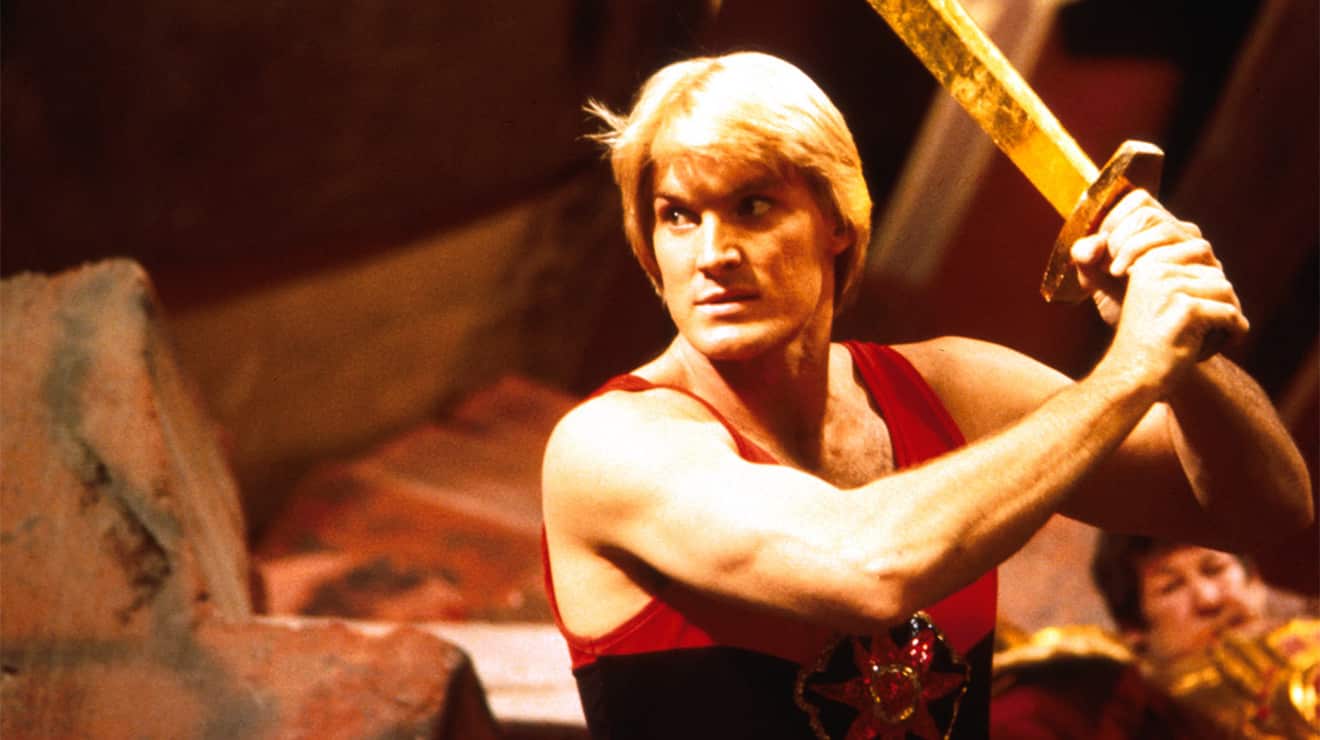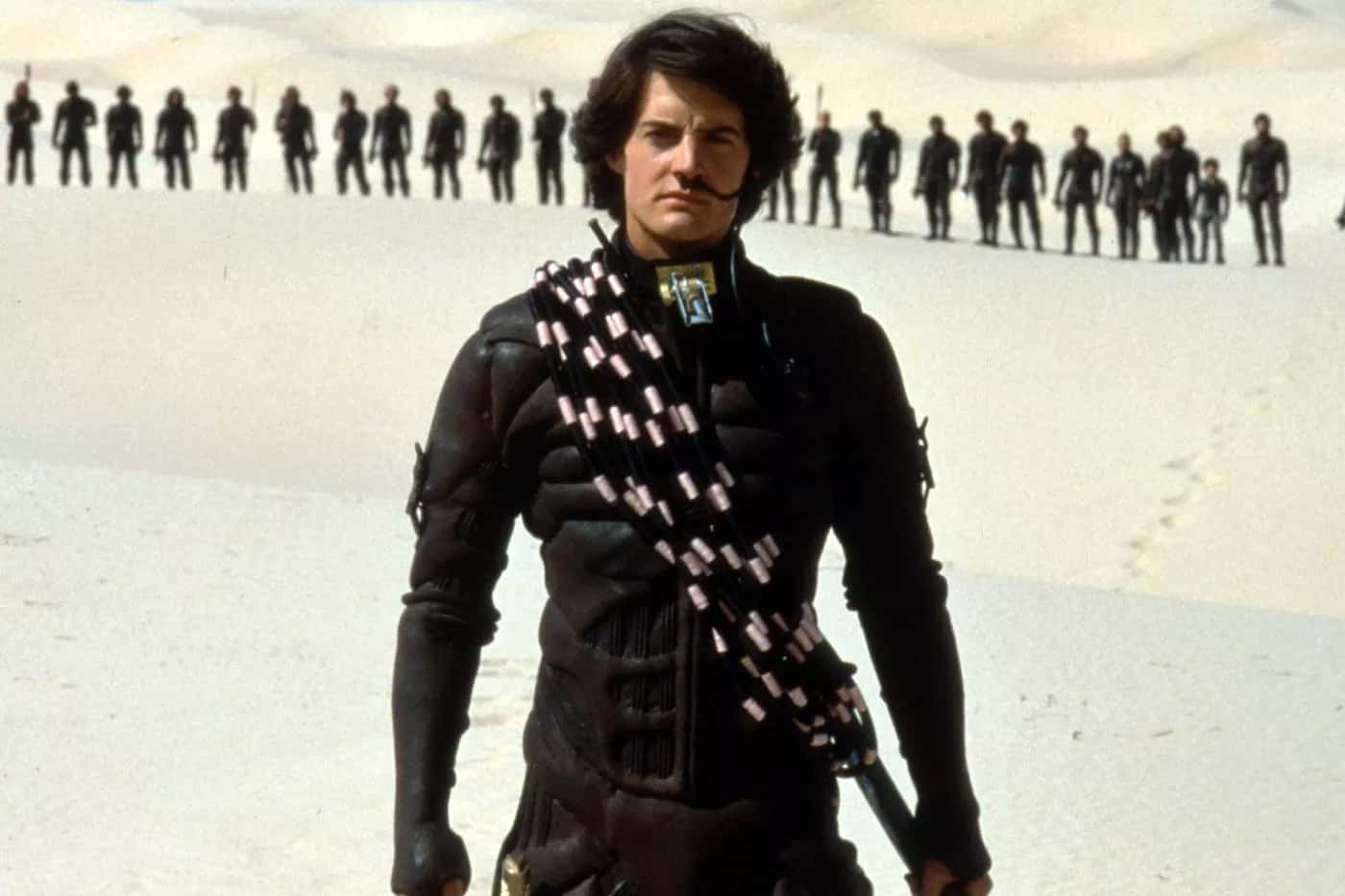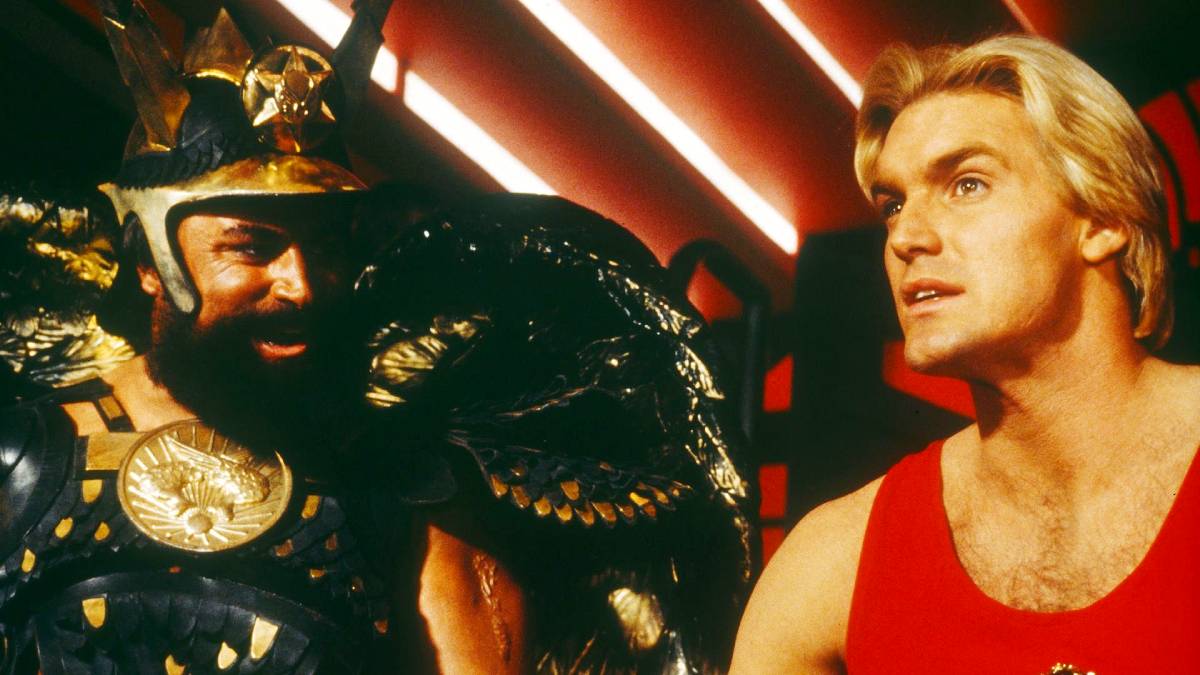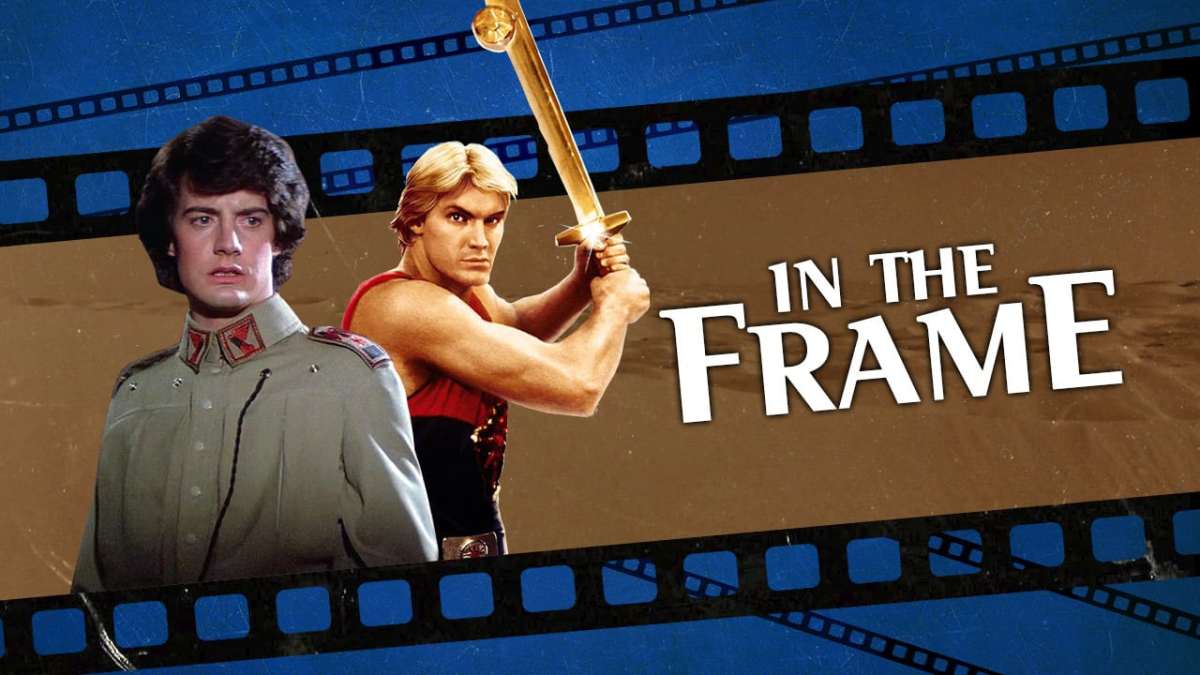This week marks the 40th anniversary of the release of Mike Hodges’ Flash Gordon, and next week would have seen the release of the first cinematic adaptation of Frank Herbert’s Dune since that of director David Lynch in 1984. Taken together, these two bright and colorful epics produced by Dino De Laurentiis offer an interesting snapshot of where mainstream big-budget cinematic science fiction was in the 1980s, particularly as framed in opposition to George Lucas’ Star Wars.
Of course, there were a lot of interesting things happening in cinematic science fiction during the 1980s, including films like Terry Gilliam’s Brazil and Paul Verhoeven’s RoboCop. Ridley Scott would redefine the genre with his work on (1979’s) Alien and Blade Runner, two of the most influential science fiction films ever made. However, Flash Gordon and Dune stand out among the decade’s science fiction as an effort to construct crowd-pleasing science fiction spectacle to compete with Star Wars.
Scott, who was briefly attached to Dune, conceded that directing it would have represented “a step very strongly in the direction of Star Wars” for his career. There were other connections. George Lucas had only developed Star Wars when De Laurentiis refused to sell him the rights to Flash Gordon. While Lynch’s work on The Elephant Man was cited as the reason that he was hired to direct Dune, it is also notable that he had turned down the chance to direct Return of the Jedi.
Critics have long noted the overlap between the Star Wars saga and religious experience, as demonstrated by the number of people identifying their religion as “Jedi.” Bill Moyers has argued that Star Wars resonated on a religious level in part because “by the end of the 1970s, the hunger for spiritual experience was no longer being satisfied sufficiently by the traditional vessels of faith.” It makes sense that films emulating Star Wars would draw more overtly from that religious subtext.

For a long time, the biblical epic was one of the default modes of Hollywood blockbuster, comparable to the ubiquity and popularity of the western or the musical. To pick an example, Sampson and Delilah was the highest-grossing movie of 1949 by some margin, earning more than three times as much as its closest competitor. At the time of its release, it was the third highest-grossing movie of all time behind only Gone with the Wind and The Best Years of Our Lives.
This was not a unique occurrence. Quo Vadis and David and Bathsheba were the two highest-grossing films of 1951. The Robe was the second highest-grossing movie of 1953, while its sequel, Demetrius and the Gladiators, was the third highest-grossing movie of 1954. These movies solidified Charlton Heston as a star, with The Ten Commandments and Ben Hur being the highest-grossing movies of 1956 and 1959 respectively.
Westerns often serve as a stock point of comparison for the modern superhero blockbuster, but there is a lot to be said about the genre as an extension of the religious epic that was popular during the 1950s, particularly in terms of production design and spectacle. This is most obvious when looking at the worlds of films like Thor: Ragnarok, Man of Steel, or Wonder Woman, but it is also obvious when looking at the epic battle scenes of movies like Avengers: Infinity War or Avengers: Endgame.
However, the biblical epic entered a decline during the 1960s. There were several reasons for this. The scale and budget of these movies expanded to a point where they could no longer survive in the market. The non-religious historical epic Cleopatra was both the highest-grossing film of 1963 and one of Hollywood’s biggest flops. John Huston’s The Bible, produced by De Laurentiis, was the highest-grossing movie of 1966 but cost so much that it failed to turn a profit.

Hollywood itself was changing around the biblical epic. The old studio system that churned out those sorts of epics was eroding towards the end of the 1960s, giving way to the New Hollywood movement. The future of religion in cinema looked more like the grounded Italian neo-realism of Pier Paolo Pasolini’s The Gospel According to St. Matthew from 1964 than any more traditional religious epic. Hollywood was not necessarily interested in making movies on that scale in that style any longer.
Of course, the New Hollywood movement would not last. Following several embarrassing financial failures like William Friedkin’s Sorcerer, Martin Scorsese’s New York, New York, and Michael Cimino’s Heaven’s Gate, the studios began to push back against auteur directors. Looking for a more stable model of film production, they hoped to emulate the success that Steven Spielberg had enjoyed with Jaws and George Lucas had seen with Star Wars.
Thus began the era of the blockbuster. Initially, it seemed like Hollywood studios didn’t entirely understand this new mode of filmmaking and so returned to the language and trappings of their older successes operating at a similar level. As such, it makes sense that films like Flash Gordon and Dune would look and feel so much like the biblical epics of earlier decades, as those were the only films on that scale with which the studios had any experience.
This is obvious looking at the production of these films. Star Wars was at the cutting edge of a special effects revolution, with Lucas founding Industrial Light and Magic to realize his vision. In contrast, the special effects of films like Flash Gordon and Dune hearken back to an older style of moviemaking. This is most obvious in how the ships fly and glide in Dune, often looking like they have been directly lifted from a classic science fiction movie like The Day the Earth Stood Still.

Similarly, parts of Dune were shot using an outdoor blue screen. The production team acknowledged this was “unconventional by contemporary standards,” but it was standard for classic biblical epics. Rejecting the “used future” aesthetic of Star Wars, a lot of Flash Gordon and Dune unfold in grand palaces and stately surroundings. While Star Wars begins after the Jedi have fallen, Flash Gordon and Dune feature regally costumed characters wandering through lavish and spacious sets.
This 1950s nostalgia made sense. Although rooted in the 1930s, Flash Gordon had enjoyed a revival in popularity on television in the 1950s. Although Dune was published in 1965, David Lynch has acknowledged a fondness for the decade, conceding, “The ’50s are just about it for me.” This captured something of the general mood, as a palpable nostalgia for the 1950s ran through the 1980s, reflected in pop culture like Back to the Future, The Wonder Years, and Stand by Me.
Flash Gordon had originally been conceived as something of a space age biblical epic. Writer Michael Allin summarized the original pitch for the film, “Ming was a god. Flash and Dale were Adam and Eve, and Ming was an evil deity chasing them across the universe.” Even in the finished version, the audience is introduced to Ming the Merciless (Max von Sydow) as something equivalent to an angry deity, ravaging the earth with disasters (“acts of god”) for his own amusement.
The religious subtext in Dune is more obvious, with Paul (Kyle MacLachlan) explicitly positioned as a religious figure. Frank Herbert drew much of the story’s mythology from a variety of Christian, Islamic, Jewish, and Buddhist sources. Even before Paul is named as the Mahdi, House Atreides is openly religious. “May the hand of God be with us all,” Paul remarks. At the movie’s end, when Paul makes it rain on Arrakis, it is equivalent to Moses parting the Red Sea in The Ten Commandments.

Max von Sydow appears in both films, playing Ming the Merciless in Flash Gordon and Leit Kynes in Dune. Both play archetypal religious roles: Ming as a vengeful God, Kynes as John the Baptist to Paul’s messiah. Von Sydow had played Jesus Christ in The Greatest Story Ever Told, one of the last big studio biblical epics. Von Sydow is joined in Dune by José Ferrer, who played King Herrod in The Greatest Story Ever Told, another ruler who needs to kill a young messiah to secure his reign.
If Flash Gordon creates something equivalent to an areligious update of the classic biblical epic, then Dune offers something more subversive. Befitting the novel’s subversions of the “Chosen One” narrative, Lynch renders the tropes of the biblical epic unsettling and horrific. Paul’s address to his followers evokes Triumph of the Will, while his young sister Alia (Alicia Witt) dances in a burning wasteland surrounded by dead bodies. At the end of the film, Paul seems to break the world itself.
The spectacle of Flash Gordon and Dune sharply contrasts with the actual and overtly religious films of the same period. Movies like Monty Python’s The Life of Brian and Martin Scorsese’s The Last Temptation of Christ were notably smaller and more intimate in scale than classical biblical epics. The Life of Brian was a spoof, while The Last Temptation of Christ “broke decisively with the biblical epic tradition.” Both were controversial to religious audiences.
Still, it is interesting that these two early ‘80s attempts to create crowd-pleasing science fiction spectacle would draw so heavily from the tradition of 1950s biblical epics, by stripping out much of the explicitly religious content while framing them as fantastical adventures. It might even be possible to connect the subversive use of the language of the biblical epic in Dune to the weirder breed of modern religious spectacles like Noah and Exodus: Gods and Kings.
Still, at the dawn of the blockbuster age, Flash Gordon and Dune seemed to position blockbuster science fiction as something close to a secular religious epic.






Published: Dec 7, 2020 11:00 am